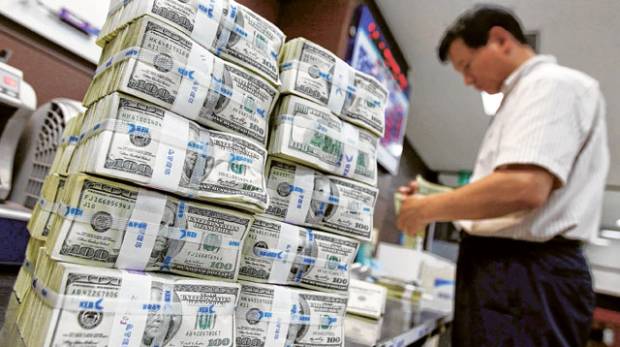By Jeff Ferry, CPA Research Director
It may have been obscured by the looming State of the Union address, but there was quite a kerfuffle in Washington recently.
Clinton-era Treasury Secretary Larry Summers went semi-ballistic over comments made by his successor, Steven Mnunchin. During the recent World Economic Forum in Davos, Treasury Secretary Mnuchin made a passing remark that “obviously a weaker dollar is good for us as it relates to trade and opportunities.” Summers quickly took to the pundit-sphere to criticize Mnuchin for perceived failures in “style and substance.” Specifically, Summers lectured Mnuchin that there are “good economic reasons the last seven Treasury secretaries stayed with the strong dollar mantra.”
The irony in all of this is that Mnuchin was merely stating a simple fact: A weaker dollar will make U.S. exports more competitive. But the signal from Mnuchin that our economy would benefit from a lower dollar was a welcome change from some 30 years of economic neglect of Main Street America from previous Treasury Secretaries..
In this case, math matters. Summers and his ilk have been cheerleaders for globalized trade that has left the United States running 41 consecutive years of trade deficits. Such record levels of imports are only made possible through continued borrowing from other nations. Treasury Secretary Mnuchin was simply stating what ought to be obvious—that the dollar’s international value needs to fall in order to both boost U.S. exports and curb an ongoing flood of imports.
The great shame is that Mnuchin’s comment was met with such a firestorm of criticism from the very economists who are enfeebling our export industries while leading the United States into a potentially calamitous debt trap. Their philosophy demonstrates a troubling naivety—that America is simply too big, too rich, and too unique to ever suffer the repercussions of perpetually living beyond its means. But in a hostile world, they fail to recognize a simmering unpleasantry: One day, foreigners will tire of financing America’s consumption-heavy lifestyle.
According to textbook economics, persistent trade deficits are not supposed to happen. A trade deficit is supposed to set in motion forces that close the deficit. The most common is a fall in the value of a nation’s currency, making exports cheaper and imports more expensive. In the case of the United States, the dollar has obstinately refused to fall, however, despite persistent annual trade deficits. In 2016, our $505 billion trade deficit was larger than the entire GDP of all but 22 countries in the IMF database of 216 nations. In fact, the U.S. dollar’s inflation-adjusted exchange rate, even after recent declines, is still hovering at levels close to the 1990s and early 2000s.
As Secretary Mnuchin’s comment indirectly observed, an overvalued dollar weakens America’s export competitiveness. Summers quibbles with this because a weaker dollar would also reduce U.S. “purchasing power” for imports. But Summers must know that America’s ongoing purchases are only made possible through continued borrowing from overseas. It would be better to let a gradually declining dollar today temporarily reduce our purchasing power while stimulating the growth of production, leading ultimately to more production, more consumption, and less debt.
Unfortunately, something has to give. Realistically, the United States must get ahead of this borrowing and overconsumption. And the only realistic way to do so will be to address the dollar’s artificially hyped value. Various domestic manufacturing and agricultural groups are urging the adoption of a Market Access Charge (MAC) to ease the dollar back toward equilibrium. Imposing a very small fee on foreign purchasing of dollar-denominated assets, for example, could ease some of the pressure. Any such fee could simply be tied to the trade deficit—essentially a free-market approach to addressing exchange rates. There’s certainly a precedent for this, since before 1914 America’s gold standard helped to adjust the nation’s trading position in times of deficit.
Congressional response to such a MAC plan has been positive—which makes sense since Members are at least listening to their constituents’ ongoing concerns about lost middle class jobs.
Treasury Secretary Mnuchin should be praised for his straight talk. And conversely, Summers should at least consider visiting Main Street America some time, to gain perspective. In browbeating Mnuchin, he advised that “no nation can devalue its way to prosperity.” That’s funny talk from a man who has continually supported “normalized” trade with China—a manufacturing powerhouse that has deliberately undervalued its currency over the last 20 years to boost exports and drive economic growth. It’s time to tackle America’s overvalued currency—something that was suggested in the 2016 populist revolt, when voters showed their scorn for politicians who fail to recognize economic reality.













